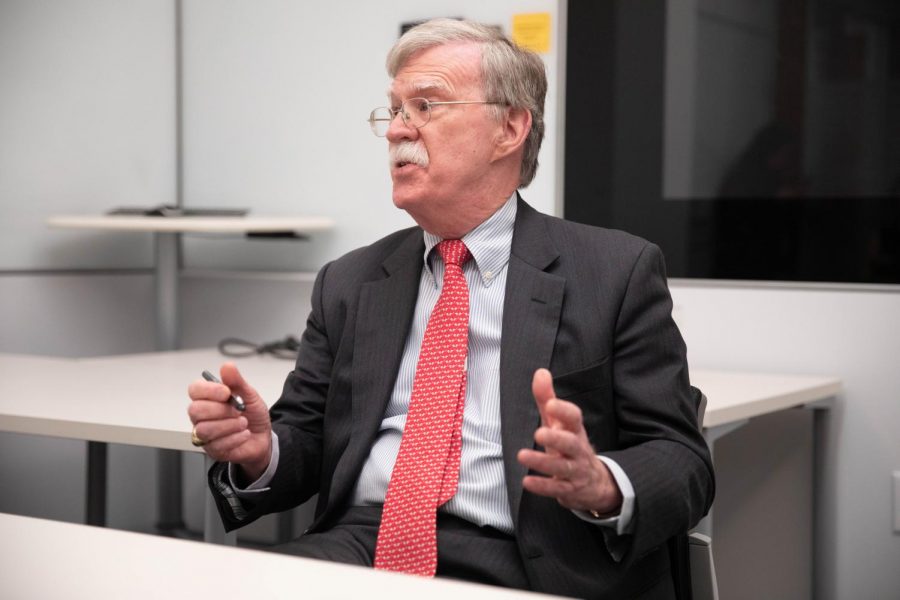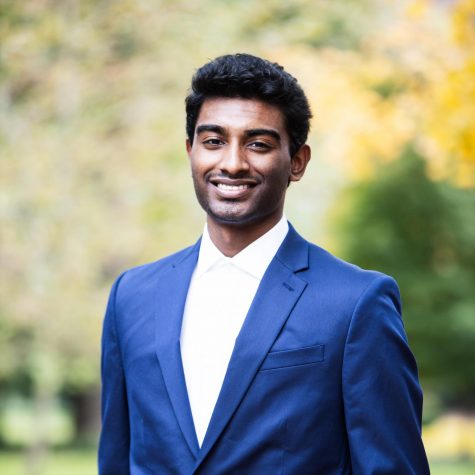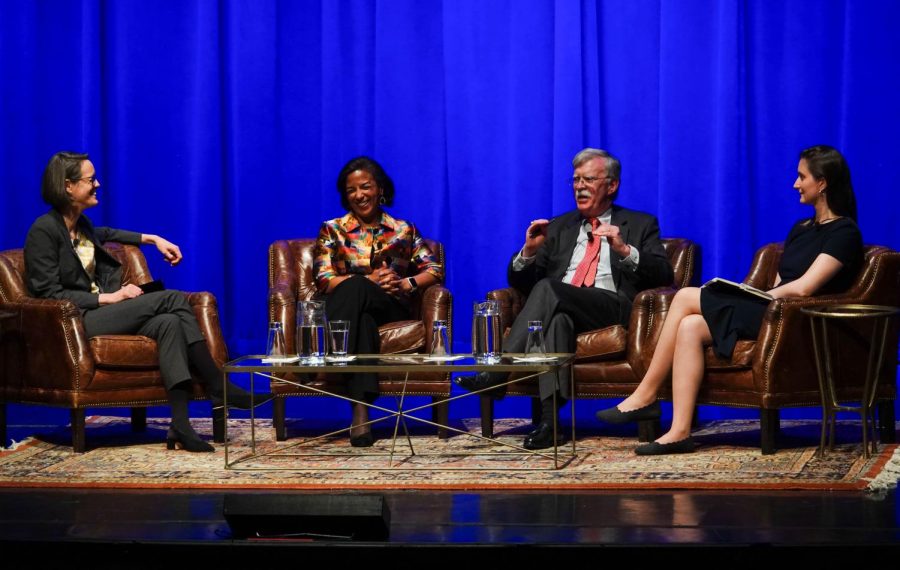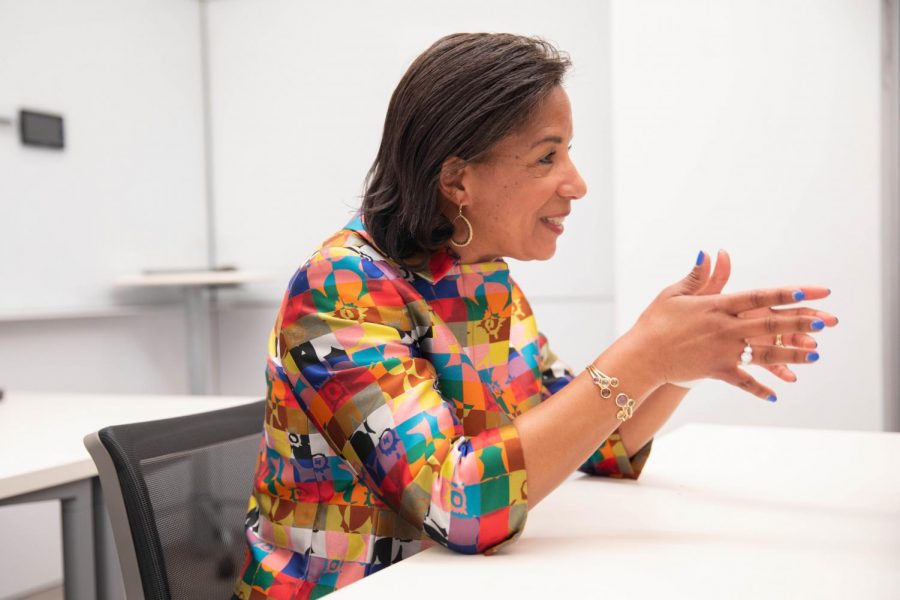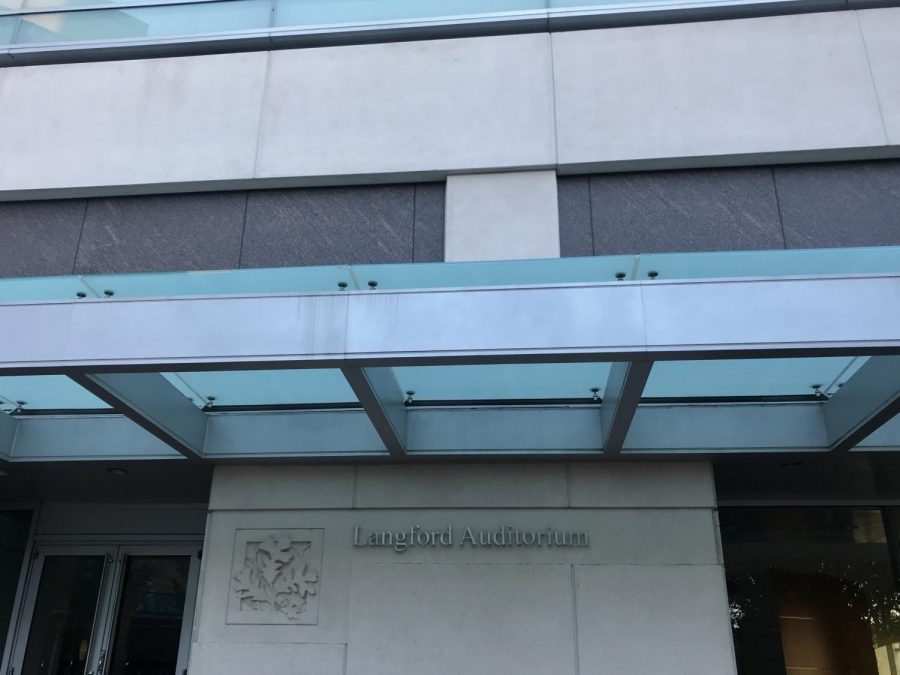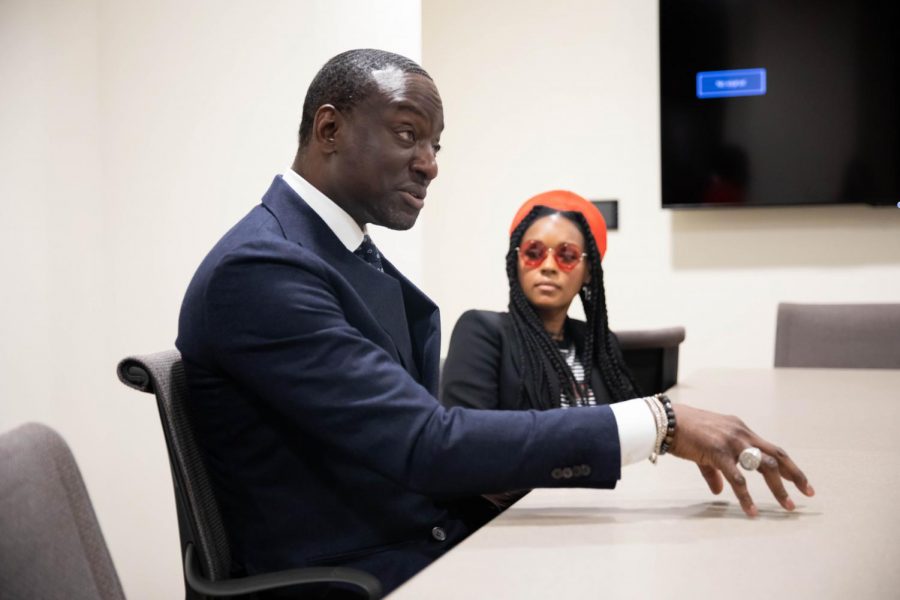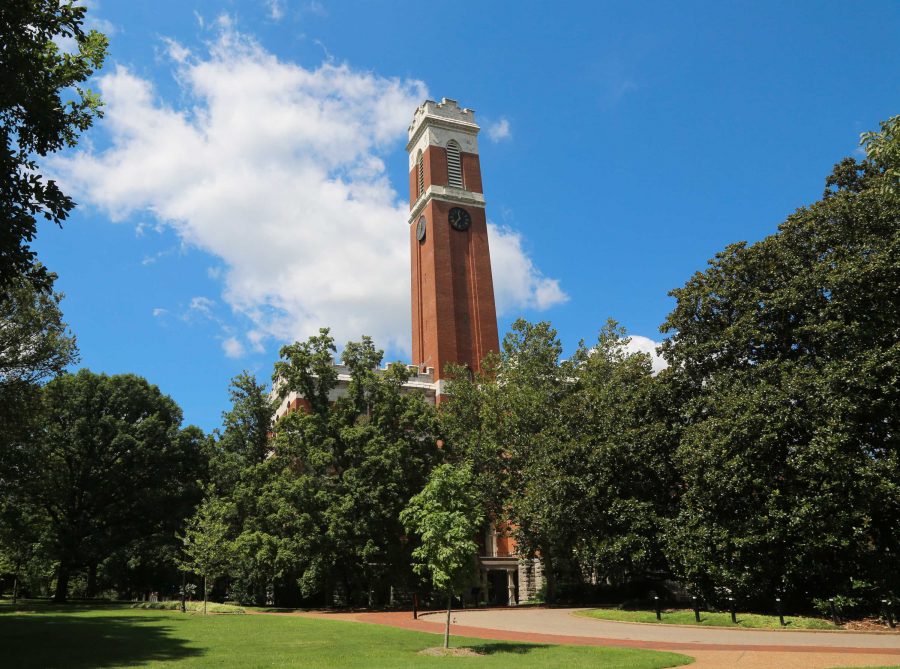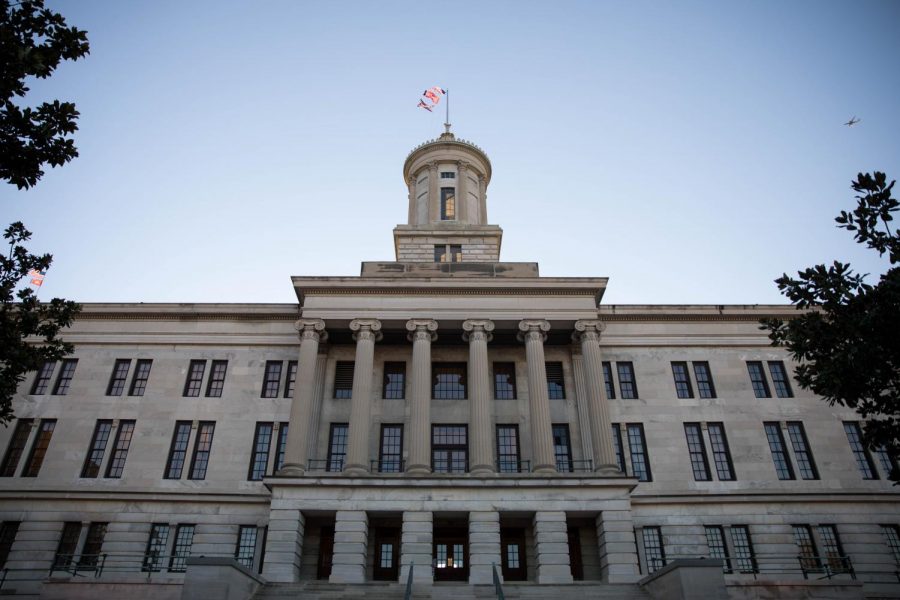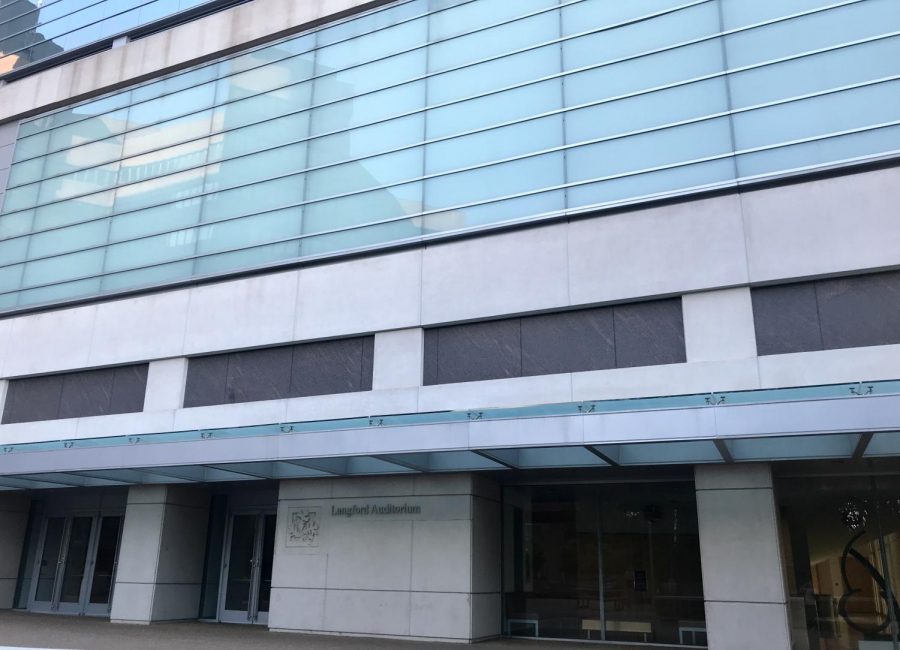The Hustler sat down with former national security advisor John Bolton before he delivers his Chancellor’s Lecture on global leadership Feb. 19. The event will be in Langford Auditorium at 7 p.m as a discussion moderated by Vanderbilt Law Review editor in chief Hannah Miller and Vanderbilt Law School international law professor Ingrid Wuerth.
Bolton was the ambassador to the United Nations during President George W. Bush’s administration and national security advisor to President Trump. Bolton served in this role from March 2018 until Sept. 2019, a period of 17 months, until he was ousted from his role. The House of Representatives asked Bolton to testify during Trump’s impeachment, and Bolton declined unless the House obtained an official subpoena. Bolton later said he would testify if requested by the Senate, but the Senate did not vote to allow witness testimony in the impeachment trial.
Vanderbilt Hustler: What do you hope the public gets out of your book and the information includes regarding your interactions with President Trump, which you decided to release post the conclusion of the impeachment process?
John Bolton: Well, I didn’t come here to promote the book. People like to write about that, you’ve asked a question about it, I certainly respect that. But I’m not going to talk about the book in part because it’s still in the pre-publication review process, and to avoid criticism that I’m simply out talking the book, which I am not. I’m happy to talk about anything dealing with U.S. foreign policy.
How do you feel about the expansion of Trump’s travel ban to include countries such as Sudan, Tanzania, Kyrgyzstan, Myanmar, Eritrea and Nigeria, effective in about five days?
Well, I think the approach of the travel bans itself was flawed. I think the idea should be to enhance our ability to identify who the terrorists are. There are some cases where a near-total ban, I think, makes sense – countries that we’ve declared state sponsors of terrorism, where we’ve identified, as in the case of Iran, actual instrumentalities of the government of Iran, as a foreign terrorist organization. But I think the blanket declaration simply invites criticism that obscures the fundamental objective, which is keeping terrorists out of the United States.
What approach would you suggest?
Well, as I said, I think you need substantial enhanced capabilities to try and identify who terrorists are. Now we’ve made a lot of progress since 9/11, but I can just give you this one example. Before 9/11, State Department officers, granting visas in many countries in the Middle East, as an example, would automatically grant a visa to somebody who bought a first-class ticket. Because after all, how could you be a terrorist if you bought a first-class ticket? That just defies common sense. But we do have a lot more capabilities than we did then. And that’s the approach I would use.
Do you think it’s important for college students to hear from both sides of the aisle when it comes to foreign policy and national security? And if so, why?
Sure. Absolutely. I think that’s one of the advantages of being in college is that you should feel unrestricted in what you learn and what you do. And to me, one of the most troubling aspects about what I read of life on campus today is the pattern of people saying, “if I don’t like a point of view or I don’t disagree with a point of view, I’m going to shut it down.”
I think that’s the exact opposite of the concept of academic freedom. And after all, if you’re not free to speak and listen now in your life, when will you ever be this free again? So people shouldn’t fear freedom of speech, they should welcome it. And remember the lesson is that the remedy for bad speech is not less speech, it’s more speech.
So do you think there’s ever a line where someone goes too far where you don’t invite them to a college campus ever?
Well, I think if somebody is conspiring to overthrow the government by force or violence, but, what are you afraid of? You know, if you want to discuss with somebody, debate their principles, even if you find them abhorrent.
If you try and suppress their speech, you make them the issue, you’re giving them publicity. Debate with people. Be open about it. Have discussions. Don’t fear the idea that if you let somebody speak, they will inevitably prevail in what Justice Holmes used to call the free marketplace of ideas.
The best remedy is to allow debate and trust the people. If you don’t trust the people, you don’t have much of a faith in democracy.
How did your relationship with the president’s office during the Bush administration differ from during the Trump administration?
I was in both Bush administrations, 41 and 43. I was at the State Department, so I was at the White House obviously a lot less. I worked for the Secretary of State in those cases. So when I was there, when I would see the President, I would be with higher authority from the department, whereas obviously as National Security Advisor, I saw the President several times every day when we were in Washington. I’d talk to him on the phone even if I wasn’t in the Oval Office or his private office. So it’s a completely different experience to be a National Security Advisor. I was working in the White House.
What do you think the role of a National Security Advisor is in witnessing an impeachable offense?
Well, I think since the definition of an impeachable offense is a matter of debate, it’s a matter for every individual’s conscience.
It’s a matter for your conscience. How long you worked for any president when you come to have disagreements with him, and how long you decide to stay. And I have my own standards. I resigned from the White House on September the 10th for a lot of different reasons. But I don’t criticize anybody who makes a different decision. Everybody’s got to do that according to their own lines.
Newsweek reporter Bill Powell asked a former diplomat, the Ministry of Foreign Affairs of South Korea, what he thought of you, and he said that “John Bolton is the reason that North Korea has nuclear weapons today.” How would you respond to that?
[Laughs] I think that’s ridiculous. Honestly, the president is the top foreign policy decision-maker in every administration. The only thing any of the rest of us do is give him advice and then carry out his orders. I think that you’ve seen, unfortunately, over four American administrations, the failure to stop North Korea in making progress in getting deliverable nuclear weapons. That’s a terrible record for our country.
It endangers us and our people, and endangers our friends and allies in the Asian Pacific. Indeed, it endangers peace and security around the world because North Korea with nuclear weapons will sell those weapons to anybody with hard currency to buy. So I make no apology for taking what some people call a hard line against North Korea’s nuclear weapons program because you can bet, and you can see the history and you can read it. A softer line has failed.
So can you share your thoughts on whether the Libyan model for nuclear disarmament could pave the way to nuclear disarmament? And do you think the current administration is making an effort by not following this model?
Well, look, the Libya model, I appreciate the question because now I can explain what the Libya model really means. In 2003, through the efforts of the United Kingdom and the United States, but the UK opened the discussion and we participated in it, it became very clear that Muammar Gaddafi had made a strategic decision to give up nuclear weapons, that he saw the overthrow of Saddam Hussain. In fact, the real breakthrough in the talks, primarily, with the British came after we found Saddam Hussein in that spider hole in Iraq, and Muammar Gaddafi looked around and said, “Hey, that could be me. I don’t want that to happen.”
And we had also interdicted a shipment of components for the centrifuges he wanted to build coming from Malaysia on a ship called the BBC China, which we saw coming through the Suez Canal, and we diverted it to Italy. Italian customs seized the parts. So Gaddafi knew we were onto him. And that’s when he said unequivocally, and we believed it, that I’m giving up nuclear weapons. And he followed through on that immediately.
In early 2004, an American team went in and began the dismantlement of Gaddafi’s nuclear program. Now, we caught it at a fairly early stage, but we went in, we had complete access. We boxed it up, we put it on ships, and we sent it to Oak Ridge, Tennessee, where it is today. And where there’s plenty of room for the Iranian and North Korean nuclear weapons programs too.
The North Koreans have, over a period of now close to 30 years, not demonstrated a single piece of evidence that they’ve made a strategic decision to give up nuclear weapons. And neither have the Ayatollahs, and until you have reason to believe that, there’s no reason to think that they will adhere to any commitments that they might make, as neither the Iranians nor for the North Koreans have. Gaddafi, we knew had done it because we were boxing up this stuff.
That’s what the Libya model is now. People say, “Oh yeah, but then after the Arab Spring, Gaddafi was overthrown and killed by his own people,” so that shows he never should’ve given up his nuclear weapons program. That is a classic demonstration of the post hoc ergo propter hoc fallacy, after the fact, therefore, because of the fact.
In 2003, 2004, nobody on earth, literally nobody, predicted the Arab Spring. And, the Arab spring as it affected Libya and Gaddafi, had nothing to do with the renunciation of nuclear weapons. So people who conflated saying, well, Gaddafi gave up nuclear weapons and then he was killed by his own people seven years later are confusing two completely unrelated historical events.
So earlier this week you called the White House review of your book censorship. Do you think the process has been unfair to their pre-publication?
I said we want to see if it turns out to be censorship. The process is underway. We’ve indicated, my attorneys indicated, we’re worried the process has been breached. It’s obviously a pretty sensitive circumstance when the manuscript is being viewed by the White House itself. But we’re in the process. We’re going to play through and see what happens on it. And I’m not going to comment any further on this point.
What do you think of any potential leaks that have come out about the book?
Well, the leaks didn’t come from me. I can assure you, whoever leaked, or what are purported to be descriptions in the book about Ukraine, is no friend of mine. We’ve made that clear to everybody. The purpose of writing a book is to try and write history to tell us stories, four or five hundred pages long.
And there is a reason to do that rather than dribble it out, in with all due respect, interviews in the media where you get 45 seconds here or there. Maybe people don’t want to read four or five hundred pages, but that’s why I think it’s important and why the memoir is intended to tell a coherent story.
How do you believe you’ll be remembered in the future?
I have no idea, and I don’t pay any attention to it. I’ve got to do what I think is right and according to my own conscience today. And history, a hundred years from now, will probably look a lot different than it does today. If you’re worried about your place in history, you’re worried about the wrong thing.
How would you respond to dealing with the weight of presidential pressure when pressured to give advice on any of these issues?
I don’t have any trouble expressing my opinion. [Laughs]
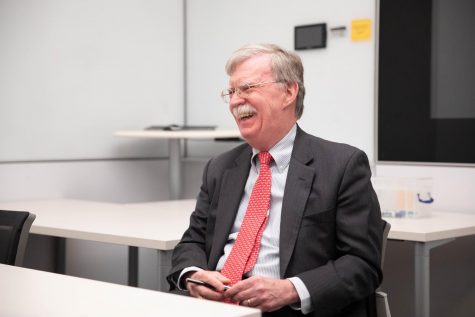
John Bolton laughs during his interview with The Hustler.
It’s an honor for anybody to serve in a senior position in the government. There’s no doubt about it. But you certainly have to consider a lot of factors in providing advice, especially on national security, which is often a matter of life and death. But if you’re not able to handle the pressure on a 24/7 basis, then with all due respect, you need to try something else.
The interview has been edited for clarity.

